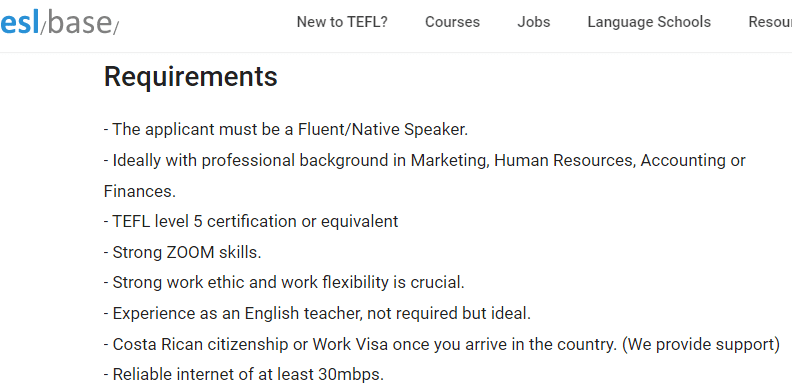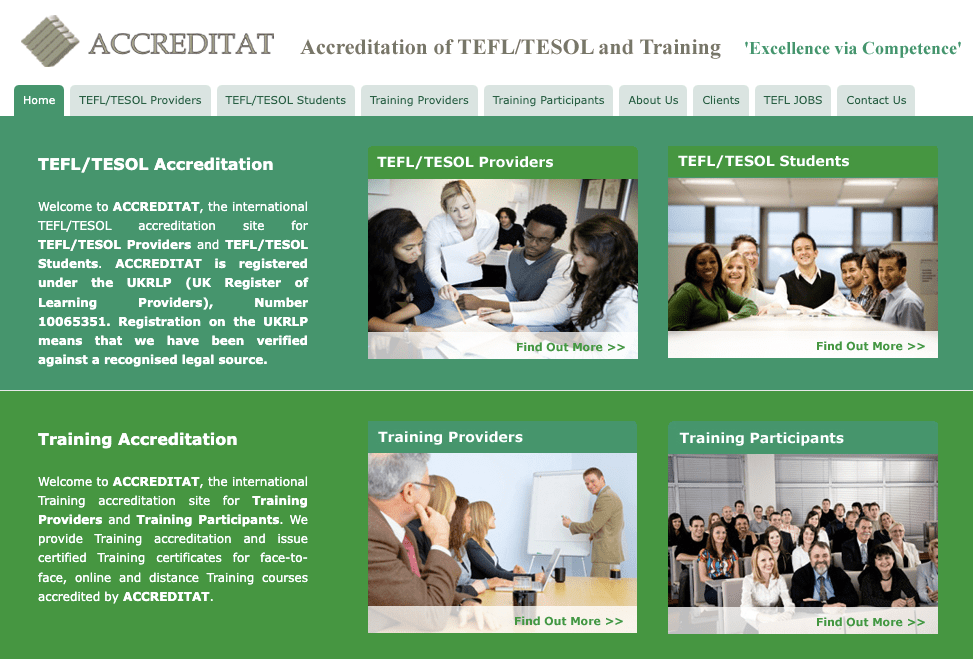Is a TEFL certification worth it? That depends on your long-term plans and individual circumstances, but, generally, the answer is a resounding yes.
TEFL certification pays for itself easily and then some for teachers breaking into the global ESL industry. Here we’ll explore why TEFL certification is a valuable professional credential and how earning one benefits teachers.
What’s a TEFL?

TEFL is an acronym used in the English as a second language (ESL) industry that stands for “teaching English as a foreign language.”
Because teaching English to non-native speakers is a unique discipline that requires a special set of skills, employers often require TEFL certification as a condition of employment when they’re considering teaching candidates.
TEFL certification is especially useful if you are a non-degree holder or a non-native English speaker because it can make up for deficiencies elsewhere in your CV.
Is a TEFL certification worth it?
Yes, TEFL certification – a critical investment for any effective teacher — is definitely worth it. TEFL-certified English teachers earn higher salaries and enjoy access to more jobs than teachers who have not earned any certification. An increasing number of schools and governments require that foreign English teachers present proof of TEFL certification to get hired and/or get a visa.
So, if you want to:
- Hone your teaching skills
- Learn how to thrive in an unfamiliar cultural milieu
- Make more money
- Get hired at higher-caliber schools
- Meet other English teachers working abroad
- Establish a professional support network
… Then you definitely want to consider getting certified.
Who requires a TEFL?

Every English teacher benefits from TEFL certification, but exactly who requires a TEFL certificate depends mostly on where you want to teach and a little bit on your background.
In some ESL destinations, TEFL certification is a non-negotiable must-have (exceptions are sometimes made when a candidate is an English major or with related teaching experience). These include, most notably:
- China
- Vietnam
In many more countries, TEFL certification is a definitive advantage in the job market but not having one won’t prevent you from finding work. These include:
- Certain Southeast Asian countries like Thailand, Cambodia, and Indonesia
- Mexico
- Much of South America (Peru, Bolivia, etc.)
See more about how to teach English abroad without a TEFL certification.
Many employers list TEFL certification as a requirement in their job ads – like the one below posted to ESLBase from a school in Costa Rica. But bear in mind that these are not always hard and fast requirements. Even if you don’t have TEFL certification or another listed requirement, but you really want the job, fire off an application anyway. Many schools are willing to negotiate with the right candidate.

What are the benefits of a TEFL certificate?
TEFL certification confers numerous benefits. The main ones are:
- Learning skills to manage a classroom (harder than it looks, as anyone with experience will say)
- Becoming a great lesson planner (also easier said than done)
- The ins and outs of English grammar
- Feeling confident before teaching your first class (anything that makes you slightly less nervous is a godsend)
- Looks great on a resume
What kind of TEFL Certification is best?
A quick Google search will return a veritable constellation of TEFL courses, most of them offered online. There are literally thousands of companies competing for students with their own respective TEFL courses.
“Caveat emptor,” as the legal expression goes. “Buyer beware.” It’s on you, the customer, to vet them and separate the wheat from the chaff.
There are two main criteria by which you should measure all TEFL certification courses.
- At least 120 hours. TEFL courses are assigned numbers according to how many hours it takes to complete the course (in theory or in practice). Course lengths range from 40 hours to 180 hours. Courses under 120 hours do not meet the threshold of most employers. Many schools will not accept certificates that are less than 120 hours.
On the other end of the spectrum, courses over 120 hours are overkill for most purposes.
Therefore, in most cases, for future ESL teachers who are new to the industry, 120-hour courses make the most sense. - Accredited. Never waste your time or money on TEFL courses that are not accredited by one of the multitudes of recognized accrediting bodies.
Leading accrediting body ACCREDITAT has vetted and approved all TEFL Hero courses. Other major accrediting organizations include ACCET, IATEFL, and Teacher Training Council.
What TEFL course format is best?
In addition to varying by hour length and accreditation, TEFL course are also formatted in different ways with important logistical considerations for students.
Here is a brief survey of each format – on-demand online, in-person, live online, or hybrid.
On-demand
Courses in this format are conducted online. There are no physical materials used such as textbooks, nor will you meet any other students either online or in-person. There is no instruction element, either online or in-person. It’s a very solitary endeavor.
TEFL hero’s 120-hour online course is the most affordable fully certified on-demand course on the web.
In-person
In-person classes, before the digital revolution, were otherwise known as “classes.” The in-person qualifier is now necessary to indicate a course conducted in person, with face-to-face physical interaction.
There is no substitute, for some learners, for in-person classes as the online classroom is not sufficient to replicate the experience in a physical classroom – at least not yet.
As explained in an article published in Education Week, Is Remote Learning Here to Stay? Yes, But It Needs to Get Better:
“Humans are social creatures and schooling is a social enterprise and learning quality decreases when instruction occurs only through a screen…That means, for many students, virtual learning remains a second-best option to in-person instruction.”
International TEFL Academy offers a decent in-person course at locations.
For whatever advantages in-person courses offer over online alternatives, the major downside here is that they are usually much more expensive and they are more of an imposition schedule-wise.
Live online
Live online courses, as implied in the name, are live classes conducted virtually. Online education (sometimes called distance learning) exploded during the COVID-19 lockdowns, accelerating a pre-existing trend of moving the classroom into the digital space. Some analysts have declared online learning “the future of education.”
Like this one from International TEFL Academy, live online courses are generally more immersive and in-depth than on-demand courses, and they provide an element of structure that might benefit those among us with poor self-discipline (you know who you are).
But, on the other hand, they’re also more expensive (this one is $1,799!) and they are more restrictive in terms of scheduling. If you have significant time commitments at work, school, or elsewhere, you might have trouble fitting a live online course into your schedule.
Hybrid
Hybrid courses utilize a combination of online coursework and in-person learning.
This course design includes both “synchronous learning” in which teachers and students meet at fixed times according to a schedule and “asynchronous learning” in which the student works through the materials on his or her own.
Many of these programs, such as this one, mainly feature self-directed coursework online for the asynchronous portion combined with teaching practicum (hands-on, supervised training) as the in-person element.
Common mistakes to avoid with TEFL certifications
As mentioned earlier, you are inundated with a barrage of TEFL course options when you look online. They are not all created equal by any stretch of the imagination. Here, we’ll discuss common mistakes that first-time teachers understandably make when evaluating a prospective TEFL course.
Mistake #1: Believing all TEFL courses are the same
This is not even close to true. TEFL courses vary by:
- Hour length
- Accreditation status
- Price
- Quality of instruction
- Course format (described above)
- Specialty
- Targeted audience
- Difficulty
Of those, the first three – length, accreditation, and price – are arguably the most important (assuming you don’t have unlimited free time and money).
Mistake #2: Trying to save with a cheap (unaccredited) TEFL
TEFL accreditation is a must-have in any course if you hope to use it for future employment. Schools will not accept TEFL courses that are unaccredited because there is no way to assure that their curricula were up to snuff.
There are numerous (dozens) TEFL-accrediting bodies out there. For the sake of brevity, here is a handful of the most common:
- ACCREDITAT
- IATEFL (International Association of Teachers of English as a Foreign Language)
- Teacher Training Council
- ACCET (Accrediting Council for Continuing Education and Training)
TEFL Hero has earned ACCREDITAT accreditation, which means that it’s recognized globally.

There are a plethora of cheap or free TEFL courses out there. Unfortunately, many, if not most, of them are unaccredited, so they are essentially worthless from an employer’s perspective, no matter how instructive they might actually be.
(Don’t worry; TEFL Hero’s free 40-hour course is fully accredited!)
Aside from lacking accreditation, other common TEFL scams include:
- Not enough hours. 120 hours is the minimum course length that many employers will accept. Courses with fewer hours might be helpful but won’t open as many opportunities as a 120+-hour course.
- Lack of independent user reviews. Lots of TEFL providers host their own reviews – but obviously you should take those with a grain of salt. They might be real but just as easily could be fake.
Whenever they’re available, look for third-party reviews – like this one for TEFL Hero’s courses – hosted on an independent platform. (Sometimes it’s hard to tell which platforms are truly independent.)
Mistake #3: Assuming practicum is required to teach abroad
Teaching practicum is a valuable component of in-person TEFL courses. It is essentially supervised teaching practice, after which an experienced ESL professional provides feedback for the purpose of improving your performance.
Teaching practicum – a tradition borrowed from education colleges — often occurs at the end of a TEFL course as a way to apply the theoretical knowledge gained in the program to a real-world setting, or as close to a real-world setting as possible, before getting thrown to the proverbial wolves.
Here are the key points to keep in mind regarding practicum:
- While teaching practicum is beneficial for many teachers, it is absolutely not essential in a TEFL course!
- Online courses do not include a practicum due to logistical reasons.
- Most employers will never ask whether your TEFL program included a practicum. In my many years in the ESL industry, I have never once been asked if my TEFL course had a practicum component.
TEFL Certification FAQs
Let us conclude here with a few frequently asked questions (FAQs) related to TEFL certification.
How long is a TEFL certificate good for?
TEFL certificates do not have a shelf-life; they are valid forever. I’ve had mine for 13 years.
Do I need a TEFL certification to teach online?
Some online ESL companies require TEFL certification and others don’t. Requirements vary widely.
Is a TEFL certification hard?
No. TEFL certification programs are designed for students to pass them. The materials are usually easily absorbed and the tests are straightforward.
The bottom line: Is TEFL certification worth it?
TL;DR, as the kids say? (Too long, didn’t read?) Here are the cliff notes on whether TEFL certification is worth it:
- More and more schools and institutions abroad require that teachers are TEFL-certified
- Teachers with TEFL certification earn higher salaries than the uncertified
- Online TEFL courses allow students to work through the materials on their own time
- Accreditation is an essential feature of any TEFL course
- Teaching practicum is not a required component of a TEFL course
Where does this post come from?
This post was originally published at Is a TEFL Certification Worth It? on the TEFL Hero Website.

